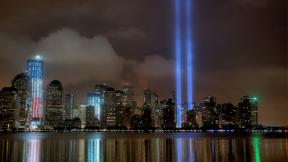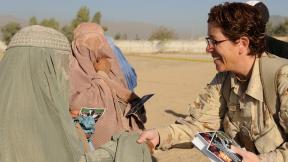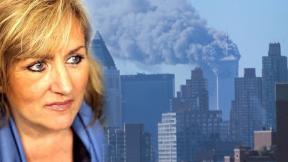
Are we safer today than we were on September 11, 2001?
Has our strategy for fighting the scourge of terrorism given us the ultimate result: safety, peace and security somewhat reminiscent of our lives pre-9/11?
We are currently spending billions of taxpayer dollars to hunt down terrorists around the world in the interest of our safety. But are we dealing with the symptoms or the disease itself?
Six months after September 11 is a good time to raise some critical questions and look for some real answers.
Does Israel's model of fighting terrorism work?
Israel's methodology of fighting terrorism is to respond with extraordinary force. Israel is working on this model for last 50 years. It controls the borders and skies above the Palestinian camps. It is said to have one of the best intelligence and counter terrorism mechanism. Every Israeli is trained soldiers. But is Israel any safer today than 50 years ago?
America now seems to have adopted the same strategy and ironically our leaders are saying that this war on terrorism may last for fifty years or so. Responding to terrorism with overwhelming force has not worked even for Israel. Despite its full support by America with billions of our tax dollars, Israel remains one of the most dangerous places on the planet. Do we really want to live like Israelis?
America is doomed to fail if it follows Israel's strategy of fighting terrorism. Except that its failure will be much greater. If Israel cannot crush terrorism in its tiny country, how can America do that in a far bigger world.
America at the helm of a global village is its leader. Our aggressive capitalism requires open trade, open travel, access to the world markets. We need to be in the world to deal with the world. We cannot just deal with this problem by counter-force alone. We can, however, begin to defeat it with dialogue, better policies, among other things.
Can we discuss foreign policy now?
While America's foreign policies and their role in providing a justification for the 9/11 attacks have been widely debated in Western Europe, the subject has been quickly brushed under the carpet at home. It is still a taboo to even mention the possibility that the two are connected.
We have to acknowledge that much of the world hates our foreign policy, but not us. Openly discussing our foreign policies instead of labeling anyone who criticizes them as unpatriotic, could go a long way in building understanding and bridges, as well as finding new solutions to ending the scourge of terrorism.
The world is discussing how Washington dismissed the Kyoto global warming treaty, trashed the proposed International Criminal Court, spurned plans to strengthen a United Nations germ warfare agreement, lost the UN human rights seat, isolated itself at the UN Conference on Racism in South Africa and withdrew from the Anti-Ballistic Missile Treaty. The world is discussing these issues, but here in America we are not.
There is more anger against America now than pre-9/11
All scholars associate political violence and terrorism with a deep feeling of powerlessness, helplessness and anger. Most terrorists are recruited from the breeding grounds of frustrated aspirations. Our anti-terrorist strategy of the last six months has only increased anti-American feelings, whereby some individuals may now become easier prey for terrorist recruiters. The wave of sympathy for America after 9/11 in the Muslim world has now given way to an anger and frustration which far exceeds anything we have seen in the last 30 to 40 years.
In addition, America's right to act as judge, jury and executioner in the fight against terrorism is being questioned. It is creating a stronger desire for revenge, burning anger and resentment. All too often, the next stage of these emotions is an explosion of more violence.May God save all of us from this.
It's not a war on Islam but...
Although President Bush declared that the war against terrorism is not a "war against Islam", the general feeling in the Muslim world is that this is simply not true, since all of the parties targeted in this crusade are Muslim.
Where is the drive to wipe out terrorism of all forms? Where are the examples of us going after terrorists who are not Muslim? In the Philippines, there are plenty of Communist terrorists but we have ignored them while pursuing the Muslim guerillas. In Eastern India, the Naxalite geurilla movement has created death and devastationbut we are supporting India in reference to the Muslim Kashmiri guerillas. This only seeks to justify the anger of Muslims by proving that America is fighting Muslims not just terrorists.
Taking the side against freedom struggles
Although Muslims by and large consider attacks on civilians as un-Islamic, they fully support the freedom struggles in Kashmir, Palestine and Chechnya. These three issues have dominated the prayers of Muslims for a long time. In the last six months we have placed ourselves against all these freedom movements. Positioning America against these freedom movements not only convey a wrong impression of the American people to the world. It may also allow terrorist groups to recruit hardy workers from these movements.
Prior to 9/11, America was perceived by Muslims to be heavily pro-Israeli. Now we are seen as heavily pro-Indian and pro-Russian as well. Whatever diplomatic balance there was in favor of any of these causes is no longer to be found. We are now moving into Georgia to fight the Chechens. We have supported Indian positions over Pakistan's in their standoff over Kashmir.
No wonder, according to one recent Gallup survey of the Muslim world, only five percent of Pakistanis consider America its friend. This is surprising since Pakistan is the only Muslim nation whose government has fully supported America in its war on terrorism.
Since Chechnya and Kashmir have not made America or Americans their targets, it would be wiser not to create new enemies for ourselves.
Bridges of shared pain are needed
Mariane Pearl, wife of Wall Street Journal reporter Daniel Pearl, is one brave woman. Within days of her husband's murder she noted that in the same month ten other Pakistanis were killed by terrorists. She did not forget the pain of others while she herself was in grief.
Today, Muslims are the world's number one victims of violence and terrorism. They constitute the planet's largest number of refugees because of this phenomenon. America has failed to create alliances with these and many other victims of terrorism. It has failed to feel the grief of other victims as Mariane Pearl has. Instead, it has a adopted an attitude of "my victims are worthier than your victims".
As a result, we have not built bridges of shared pain. We have not joined hands with other victims in fighting our common aversion to this scourge. Rather, we have built walls and distances that are only serving to create more dislike for America as it expands its war on terrorism.
The burden of fighting terrorism, however, should not fall on the United States alone. Terrorism is an internal problem in the Muslim world as well. America's Muslim allies have a vested interest in fighting it.
For a war on terrorism to be successful, it has to be everybody's war. So far, this one has not been. This is clearly indicated by the fact that prior to the US bombing of Afghanistan, only India and Israel supported this action. Even most Europeans did not.
Are we safer today?
No, we are not any safer now than we were on September 11. It is about time that we initiate a national debate about our foreign policy and our actions against terrorism. Our fight against this crime has to be uniquely suitable in delivering a relatively peaceful world not just for us but for others as well.
The "war against terrorism" will never be won just on the battlefield any more than the Cold War was. Nor can it be won by covert action and intelligence alone, nor by economic sanctions. We are pushing the world towards more violence. We are destroying bridges when we need to use them.
Victory will require true statesmanship, a realization by the United States that our long-term interests are the same as those of the rest of the world. Justice, fairness and due process are loved by all not just by us. Justice is not justice if it is only for one party.
This civilization will go forward when we can feel for "others" the way we feel for ourselves. We have one September 11, others have many. They felt for us on that horrible Tuesday last fall. I wish we could tell them that we feel their pain as well and work together to make the world safer for all of us.
"Flickr - The U.S. Army - Apache takeoff" by U.S. Air Force photo/Tech. Sgt. Matt Hecht - Apache takeoff. Licensed under Public domain via Wikimedia Commons - http://commons.wikimedia.org/wiki/File:Flickr_-_The_U.S._Army_-_Apache_takeoff.jpg#mediaviewer/File:Flickr_-_The_U.S._Army_-_Apache_takeoff.jpg








Add new comment